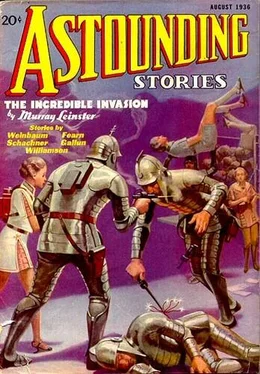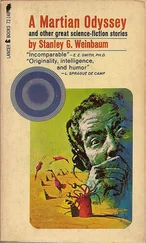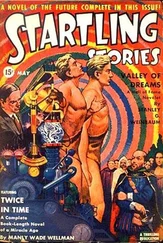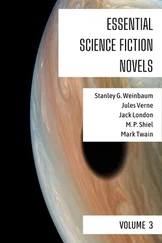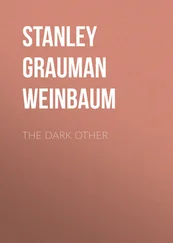Stanley Weinbaum - Proteus Island
Здесь есть возможность читать онлайн «Stanley Weinbaum - Proteus Island» весь текст электронной книги совершенно бесплатно (целиком полную версию без сокращений). В некоторых случаях можно слушать аудио, скачать через торрент в формате fb2 и присутствует краткое содержание. Жанр: Фантастика и фэнтези, на английском языке. Описание произведения, (предисловие) а так же отзывы посетителей доступны на портале библиотеки ЛибКат.
- Название:Proteus Island
- Автор:
- Жанр:
- Год:неизвестен
- ISBN:нет данных
- Рейтинг книги:3 / 5. Голосов: 1
-
Избранное:Добавить в избранное
- Отзывы:
-
Ваша оценка:
- 60
- 1
- 2
- 3
- 4
- 5
Proteus Island: краткое содержание, описание и аннотация
Предлагаем к чтению аннотацию, описание, краткое содержание или предисловие (зависит от того, что написал сам автор книги «Proteus Island»). Если вы не нашли необходимую информацию о книге — напишите в комментариях, мы постараемся отыскать её.
Proteus Island — читать онлайн бесплатно полную книгу (весь текст) целиком
Ниже представлен текст книги, разбитый по страницам. Система сохранения места последней прочитанной страницы, позволяет с удобством читать онлайн бесплатно книгу «Proteus Island», без необходимости каждый раз заново искать на чём Вы остановились. Поставьте закладку, и сможете в любой момент перейти на страницу, на которой закончили чтение.
Интервал:
Закладка:
Lilith's pack crouched; but Carver knew that this was the end. He fired. The flickering shadows came on. The magazine emptied; there was no time now to reload, so he reversed the weapon, clubbed it. He felt Lilith grow tense beside him.
And then the charge halted. In unison, as if at command, the shadows were motionless, silent save for the low snarling of the dying creature on the sand. When they moved again, it was away — toward the trees!
Carver gulped. A faint shimmering light on the wall of the forest caught his eye, and he spun. It was true! Down the beach, down there where he had left his box of supplies, a fire burned, and rigid against the light, facing toward them in the darkness, were human figures. The unknown peril of fire had frightened off the attack. He stared. There in the sea, dark against the faint glow of the West, was a familiar outline. The Fortune! The men there were his associates; they had heard his shots and lighted the fire as a guide.
"Lilith!" he choked. "Look there. Come on!"
But the girl held back. The remnant of her pack slunk behind the shelter of the ridge of coral, away from the dread fire. It was no longer the fire that frightened Lilith, but the black figures around it, and Alan Carver found himself suddenly face to face with the hardest decision of his life.
He could leave her here. He knew she would not follow, knew it from the tragic light in her honey-hued eyes. And beyond all doubt that was the best thing to do; for he could not marry her. Nobody could ever marry her, and she was too lovely to take among men who might love her — as Carver did. But he shuddered a little as a picture flashed in his mind. Children! What sort of children would Lilith bear? No man could dare chance the possibility that Lilith, too, was touched by the curse of Austin Island.
He turned sadly away — a step, two steps, toward the fire. Then he turned.
"Come, Lilith," he said gently, and added mournfully, "other people have married, lived, and died without children. I suppose we can, too."
The Fortune slid over the green swells, northward toward New Zealand. Carver grinned as he sprawled in a deck chair. Halburton was still gazing reluctantly at the line of blue that was Austin Island.
"Buck up, Vance," Carver chuckled. "You couldn't classify that flora in a hundred years, and if you could, what'd be the good of it? There's just one of each, anyway."
"I'd give two toes and a finger to try," said Halburton. "You had the better part of three days there, and might have had more if you hadn't winged Malloa. They'd have gone home to the Chathams sure, if your shot hadn't got his arm. That's the only reason they made for Macquarie."
"And lucky for me they did. Your fire scared off the cats."
"The cats, eh? Would you mind going over the thing again, Alan? It's so crazy that I haven't got it all yet."
"Sure. Just pay attention to teacher and you'll catch on." He grinned. "Frankly, at first I hadn't a glimmering of an idea myself. The whole island seemed insane. No two living things alike! Just one of each genus, and all unknown genera at that. I didn't get a single clue until after I met Lilith. Then I noticed that she differentiated by smell. She told good fruits from poisonous ones by the smell, and she even identified that first cat-thing I shot by smell. She'd eat that because it was an enemy, but she wouldn't touch the dog-things I shot from her pack."
"So what?" asked Halburton, frowning.
"Well, smell is a chemical sense. It's much more fundamental than outward form, because the chemical functioning of an organism depends on its glands. I began to suspect right then that the fundamental nature of all living things on Austin Island was just the same as anywhere else. It wasn't the nature that was changed, but just the form . See?"
"Not a bit."
"You will. You know what chromosomes are, of course. They're the carriers of heredity, or rather, according to Weissman, they carry the genes that carry the determinants that carry heredity. A human being has forty-eight chromosomes, of which he gets twenty-four from each parent."
"So," said Halburton, "has a tomato."
"Yes, but a tomato's forty-eight chromosomes carry a different heredity, else one could cross a human being with a tomato. But to return to the subject, all variations in individuals come about from the manner in which chance shuffles these forty-eight chromosomes with their load of determinants. That puts a pretty definite limit on the possible variations.
"For instance, eye color has been located on one of the genes on the third pair of chromosomes. Assuming that this gene contains twice as many brown-eye determinants as blue-eye ones, the chances are two to one that the child of whatever man or woman owns that particular chromosome will be brown-eyed — if his mate has no marked bias either way. See?"
"I know all that. Get along to Ambrose Callan and his notebook."
"Coming to it. Now remember that these determinants carry all heredity, and that includes shape, size, intelligence, character, coloring — everything. People — or plants and animals — can vary in the vast number of ways in which it is possible to combine forty-eight chromosomes with their cargo of genes and determinants. But that number is not infinite. There are limits, limits to size, to coloring, to intelligence. Nobody ever saw a human race with sky-blue hair, for instance."
"Nobody'd ever want to!" grunted Halburton.
"And," proceeded Carver, "that is because there are no blue-hair determinants in human chromosomes. But — and here comes Callan's idea — suppose we could increase the number of chromosomes in a given ovum. What then? In humans or tomatoes, if, instead of forty-eight, there were four hundred eighty, the possible range of variation would be ten times as great as it is now.
"In size, for instance, instead of the present possible variation of about two and a half feet, they might vary twenty-five feet! And in shape — a man might resemble almost anything! That is, almost anything within the range of the mammalian orders. And in intelligence — " He paused thoughtfully.
"But how," cut in Halburton, "did Callan propose to accomplish the feat of inserting extra chromosomes? Chromosomes themselves are microscopic; genes are barely visible under the highest magnification, and nobody ever saw a determinant."
"I don't know how," said Carver gravely. "Part of his notes crumbled to dust, and the description of his method must have gone with those pages. Morgan uses hard radiations, but his object and his results are both different. He doesn't change the number of chromosomes."
He hesitated. "I think Callan used a combination of radiation and injection," he resumed. "I don't know. All I know is that he stayed on Austin four or five years, and that he came with only his wife. That part of his notes is clear enough. He began treating the vegetation near his shack, and some cats and dogs he had brought. Then he discovered that the thing was spreading like a disease."
"Spreading?" echoed Halburton.
"Of course. Every tree he treated strewed multi-chromosomed pollen to the wind, and as for the cats — Anyway, the aberrant pollen fertilized normal seeds, and the result was another freak, a seed with the normal number of chromosomes from one parent and ten times as many from the other. The variations were endless. You know how swiftly kauri and tree ferns grow, and these had a possible speed of growth ten times as great.
"The freaks overran the island, smothering out the normal growths. And Callan's radiations, and perhaps his injections, too, affected Austin Island's indigenous life — the rats, the bats. They began to produce mutants. He came in 1918, and by the time he realized his own tragedy, Austin was an island of freaks where no child resembled its parents save by the merest chance."
Читать дальшеИнтервал:
Закладка:
Похожие книги на «Proteus Island»
Представляем Вашему вниманию похожие книги на «Proteus Island» списком для выбора. Мы отобрали схожую по названию и смыслу литературу в надежде предоставить читателям больше вариантов отыскать новые, интересные, ещё непрочитанные произведения.
Обсуждение, отзывы о книге «Proteus Island» и просто собственные мнения читателей. Оставьте ваши комментарии, напишите, что Вы думаете о произведении, его смысле или главных героях. Укажите что конкретно понравилось, а что нет, и почему Вы так считаете.
